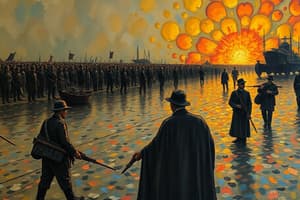Podcast
Questions and Answers
Who was assassinated on June 28, 1914, triggering a chain of events that led to the outbreak of World War I?
Who was assassinated on June 28, 1914, triggering a chain of events that led to the outbreak of World War I?
Archduke Franz Ferdinand of Austria-Hungary
What were some of the key factors that contributed to the outbreak of World War I?
What were some of the key factors that contributed to the outbreak of World War I?
Alliance system, imperialist competition, rise of nationalism
Which country's mobilization of armies led to the rapid expansion of World War I?
Which country's mobilization of armies led to the rapid expansion of World War I?
Germany
What characterized the war's course by 1916?
What characterized the war's course by 1916?
Which event in 1917 had a significant impact on the course of World War I?
Which event in 1917 had a significant impact on the course of World War I?
What event prompted Germany to seek a negotiated peace in 1918?
What event prompted Germany to seek a negotiated peace in 1918?
What treaty imposed heavy penalties on Germany after World War I?
What treaty imposed heavy penalties on Germany after World War I?
How did World War I impact the global power structures?
How did World War I impact the global power structures?
What catastrophic consequences of World War I paved the way for totalitarianism and fascism?
What catastrophic consequences of World War I paved the way for totalitarianism and fascism?
What international organization was formed as a response to the carnage of World War I?
What international organization was formed as a response to the carnage of World War I?
Flashcards are hidden until you start studying
Study Notes
Modern History: World War I
World War I, often referred to simply as The Great War or WWI, marked a pivotal moment in modern history. This conflict, which spanned from 1914 to 1918, involved a vast network of alliances and an unprecedented scale of human suffering. Here, we delve into the key aspects of this historical period.
Origins and Causes
World War I did not arise spontaneously but stemmed from a complex interplay of factors. The alliance system, imperialist competition, and the rise of nationalism all contributed to the outbreak of hostilities in Europe. The assassination of Archduke Franz Ferdinand of Austria-Hungary on June 28, 1914, by a Serbian nationalist further escalated tensions between Austria-Hungary and Serbia. The subsequent mobilization of armies by Germany led to the war's rapid expansion, ensnaring global powers such as the United States, Britain, and France.
The War's Course
The war's initial stages witnessed a series of quick victories for the German army, but by 1916, the conflict had evolved into a stalemate. Trench warfare became the norm, with both sides digging extensive fortifications and enduring heavy losses. In 1917, the United States entered the conflict, providing a significant boost to the Allies' war effort. Meanwhile, the Russian Revolution of 1917 led to Russia's withdrawal from the war, leaving Germany free to focus its efforts on the Western Front. In 1918, the German army's spring offensive, the Kaiserschlacht, proved unsuccessful, prompting Germany to seek a negotiated peace. The Armistice, signed on November 11, 1918, brought an end to the fighting.
Consequences and Legacy
World War I left an indelible mark on the world. The Treaty of Versailles, signed in 1919, imposed heavy penalties on Germany, including the loss of territory, military limitations, and reparations. The war also led to a profound upheaval of global power structures. The collapse of the Austro-Hungarian and Ottoman Empires created new states, such as Poland, Czechoslovakia, and Greece, while the Russian Revolution brought about the Soviet Union. The war's devastating impact on the human population—8.5 million combatants and 7 million civilian deaths—highlighted the horrific cost of conflict.
Commemoration and Lessons
World War I is remembered through memorials, museums, and other memorials worldwide. The war's legacy continues to shape the world we live in today. The war's catastrophic consequences, such as the rise of nationalism and militarism, led to the rise of totalitarianism and fascism in the interwar period, culminating in World War II. The war's carnage also inspired the development of the League of Nations, later replaced by the United Nations, as a means of promoting peace and cooperation among nations.
Further Reading
For those interested in learning more about World War I, several books and resources offer comprehensive and informative insights into the conflict and its impact:
- John Keegan, "The First World War."
- Hew Strachan, "The First World War: A New History."
- David Fromkin, "Europe's Last Summer: Who Started the Great War in 1914?"
- Barbara Tuchman, "The Guns of August."
- Jay Winter and Antoine Prost, "The Great War in History: Debates and New Perspectives" (edited collection).
These resources, and many others, provide valuable insights into the history of World War I, offering a deeper understanding of its origins, course, consequences, and legacy.
Studying That Suits You
Use AI to generate personalized quizzes and flashcards to suit your learning preferences.




